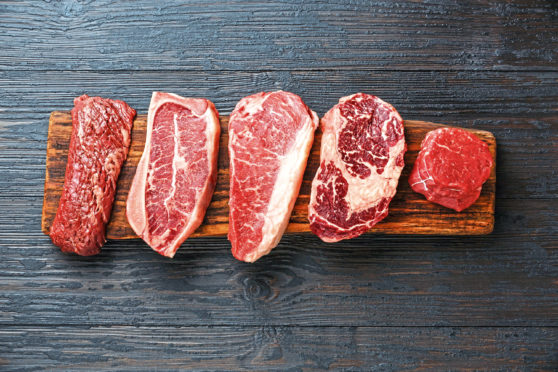The drive to eat less red meat and dairy products is like a bad smell that won’t go away, and is something that farmers and crofters can no longer afford to ignore.
Our attention is focused on Brexit negotiations and the prospect of leaving Europe without a deal in less than three weeks’ time, along with the ongoing impact of Covid-19 on society and our main customer base.
However, the biggest threat facing farmers is the growing pressure on consumers to cut back on the amount of red meat and dairy they eat, and on the wider farming industry to reduce its carbon footprint.
The latest report from the Committee on Climate Change, which advises the UK Government and devolved administrations on emissions targets, makes stark reading for livestock farmers.
According to the report, the agriculture industry accounted for 10% of the UK’s greenhouse gas emissions in 2018 and 63% of these were methane from livestock, 26% was nitrous oxide, mainly from soils, and 11% was carbon dioxide from the use of fossil fuels.
It is little wonder that recommendations in the committee’s latest carbon report – which outlines ways the UK can cut its emissions 78% from 1990 levels by 2035 – include a call for people to reduce their red meat and dairy consumption by between 20 and 50% by 2050.
The committee also recommends planting 1.087 million acres of mixed woodland to remove carbon dioxide from the atmosphere, and for just over 640,000 acres of agricultural land to be used for bioenergy production by 2035.
Industry bodies, including Quality Meat Scotland (QMS), have tried to counter this drive to cut back on red meat and dairy by highlighting the environmental benefits of Scottish livestock farming systems.
Sadly, this is barely scratching the surface of the problem.
Rather than fighting against calls to cut back on red meat and dairy, farmers should be doing all they can to reduce emissions in their businesses so they can market their produce as high-quality and environmentally-friendly.
Let’s argue for quality over quantity, and perhaps when we have taken steps to cut our emissions we can then argue against reducing consumption.
As QMS director of economics services Stuart Ashworth pointed out earlier this week, farms with lower emissions tend to be those with higher margins.
It’s a win-win.
Burying your head in the sand about farm emissions is no longer an option.
